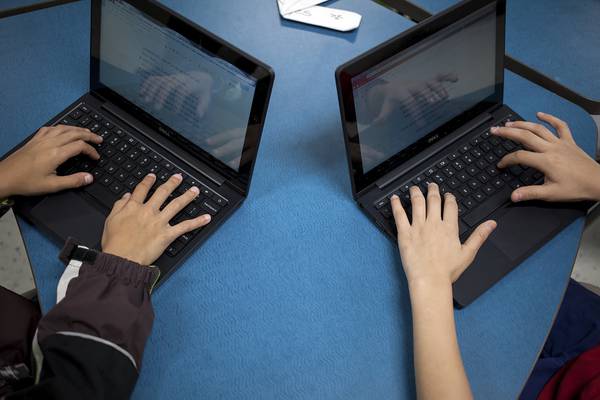The rush to get reliable internet service and Chromebooks to students across the Clark County School District to begin the school year later this month with online instruction has been a much-documented hurdle for officials.
In mid-March, when the state paused in-person learning and moved online because of coronavirus concerns, one-third of the district’s 320,000 students reported difficulties learning remotely because they couldn’t afford the technology.
Turns out, the students aren’t the only ones struggling.
Related content
Like their students, not every teacher in the district has a reliable internet connection or device. Some worry their internet plan at home isn’t designed for the burden imposed by streaming classes online and could disrupt remote lessons when they begin in less than three weeks. And while internet connections and computers are available in the classroom, that means leaving the safety of home isolation and being at risk of contracting the virus.
Evelyn Albert, in a CCSD teacher support group on Facebook, posted that her data usage was three to four times higher last month from online training and planning for the upcoming school year. Albert, a middle school English teacher, asked the group for help in identifying discounts so she wouldn’t have to pay an extra $50 for unlimited data from her internet service provider.
“School hasn’t even started yet and I already have to up my data plan with COX! This pic shows my data usage is now 3-4x higher than last month. We are a 2 teacher household just doing trainings and planning. Are there any deals for teachers’ internet or a way around paying an ADDITIONAL $50 per month for unlimited data?!?!?” Albert posted.
One CCSD middle school teacher, who wanted to remain anonymous, said she had never been able to afford the cost of internet service and claimed “there’s a lot of us who are living paycheck to paycheck.” Some of her colleagues who had delinquent accounts with internet service providers have had to make large payments upfront to reestablish service, she said.
CCSD’s starting salary for teachers without previous full-time, contracted experience is nearly $42,000 annually.
Marie Neisess, the newly elected Clark County Education Association president, said the internet was sluggish in her two-teacher household when both educators were online at the same time.
Neisess also said some teachers had to purchase equipment for online classes in the spring, when schools were abruptly closed, and weren’t reimbursed by the district.
“Educators had to pay out-of-pocket for technology,” she said.
The Nevada Department of Education has been working with teachers unions and school districts across Nevada to make sure teachers let their principals know if they need internet access. Some are too ashamed to speak up.
“Last spring, when we went into all of this, there was an assumption that all teachers were connected, and we found some were not,” said Jhone Ebert, superintendent of public instruction for the state Department of Education.
It’s unknown how many of the roughly 40,000 educators and staff are having problems getting online or with insufficient internet speed, said Lola Brooks, a Clark County School Board member. Mauricio Marin, a spokesperson for the district, said individual schools could work with the district on resources for teachers, such as internet hot spots.
As for the safety of teachers physically going into their classrooms to use the internet and school computers for online lessons this fall, Marin said all CCSD schools must adhere to state and federal safety guidelines. Staff will be required to wear masks and social distance. Signage will be posted in schools so staff can maintain awareness of the protocols. Schools will also institute regular cleaning schedules.
Sierra Vista High School Principal John Anzalone said the vast majority of the 120 teachers at his school were planning to livestream and record their lessons from their classrooms. Sierra Vista’s CCSD-issued computers don’t have embedded microphones and cameras, so the school spent roughly $8,000 to purchase microphones and cameras so all teachers will have them, he said.
Sierra Vista teachers who don’t have laptops will receive Chromebooks once it is determined all of the school’s students have the devices. Anzalone said about 1,000 students of the 2,800 students enrolled at the school had requested Chromebooks. “I didn’t want to give out Chromebooks to teachers yet, because I wanted to make sure students have those at first,” Anzalone said.
Kenneth Brown, a teacher at Sierra Vista, says educators have to be flexible with remote learning because of the uncontrollable variable of connectivity. For instance, the internet stopped for about 30 minutes in his Summerlin neighborhood two weeks ago when someone crashed a vehicle into a nearby power line.
If that had occurred on a school day, his students could have been affected, Brown worried. Ultimately, he’ll record some lessons from his classroom, where he’s not concerned about the pandemic because of the school’s safety plan.
“I feel blessed to be as supported as I am at my school. I know it is not the same situation at every school, but I know that my safety and my support will always come first for them,” Brown said.

